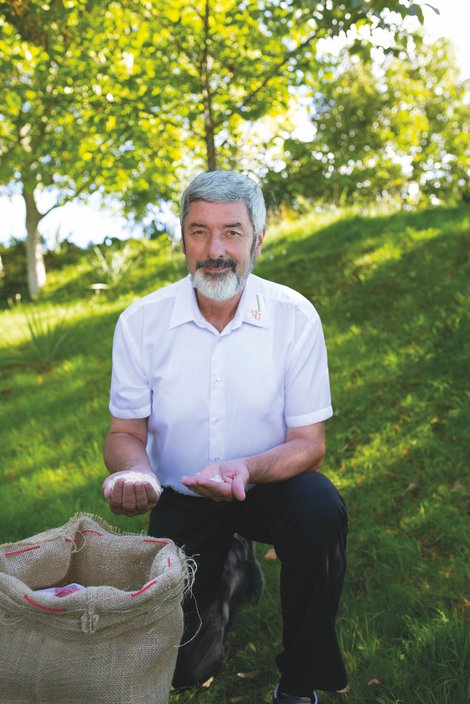Decking made from wind turbine rotor blades
NOVO-TECH creates a closed material cycle with no additional resources

NOVO-TECH GmbH from Saxony-Anhalt manufactures decking, fences, sports flooring and many other products using its unique, environmentally friendly and sustainable wood-based material. The process involves adding a granulate made from thermoplastics and specially processed GFRP to wood and other natural fibers and using this to produce high-quality, recyclable panels. Until now, the GFRP used to make wind turbine rotor blades, for example, has not been recycled in Germany. The majority of GFRP is disposed of by means of incineration. NOVO-TECH aims to return the material to the integrated circular economy on the basis of its ecological corporate philosophy and the Cradle to Cradle (C2C) principle.
Building a new production plant is a major milestone for any company. For Holger Sasse, the founder and managing director of NOVO-TECH GmbH in Aschersleben, the ground-breaking ceremony for the new production facility represents “a quantum leap forward.” For the company’s subsidiary NOVO-TECH Circular, the new building, which is within sight of the corporate headquarters, involves entering unfamiliar territory. The new plant will process and recycle not only the company’s own products, but also rotor blades from end-of-life wind turbines. Many of these turbines are currently being replaced; they are normally treated as special waste and incinerated. By contrast, NOVO-TECH will turn plastic into new decking by combining it with its own patented wood-based material known as GCC (German Compact Composite). This is one of the leading Cradle to Cradle CertifiedTM recyclable materials used for sustainable construction worldwide. In Aschersleben the first product containing recycled glass fiber reinforced plastic from wind turbine rotor blades will be made. The glass fiber reinforced material is kept within the cycle and used to produce a new material that contains no environmentally harmful, toxic or carcinogenic substances.
Contributing to sustainable deposits of CO2
“This new plant for NOVO-TECH Circular creates a closed material cycle. We are not only setting up a carbon-neutral production process, but also storing CO2 for the generations to come. With a planned production capacity of up to 43,000 metric tons per year in the initial stage of the project, we can store around 200,000 metric tons of CO₂ equivalents every year,” says Holger Sasse.
It was therefore highly appropriate that the ground-breaking ceremony for the new plant took place on Earth Overshoot Day. This fact was highlighted by Sasse in his speech. “For me that is another reason to take action quickly and build this plant,” says Sasse. He sees this as a cross-generational, sustainable project for the future and explains that sustainability for him means “planning and taking action for the sake of our grandchildren.”
Sasse, who is a building contractor, founded the company in 2005 to produce decking, fences and facade components from an environmentally friendly and sustainable wood-based material. The first step was to develop the basic formulation for NOVO-TECH’s material. This was named GCC or German Compact Composite by Holger Sasse. No other environmentally friendly material of this kind has such a high proportion of natural fibers (75 percent). However, no trees are felled to produce the wood chip. Instead the waste from the regional sawmill industry is used. The patented production process is the only one of its type in the world. Because of the high level of surface hardness of its product and the option of processing it in the same way as wood, NOVO-TECH provides a sustainable, recyclable alternative to tropical hardwoods and conventional wood-plastic composite or plastics reinforced with natural fibers.
Europe’s largest manufacturer of wood-based materials
The production of GCC began with only twelve employees working in rented buildings in Halle (Saale) in Saxony-Anhalt. The material was manufactured using second-hand machinery. Following the move to Aschersleben, the company has constantly increased its production capacity and range of products. NOVO-TECH develops, manufactures and sells extruded products and compounds. Today around 160 people are employed at the site in Aschersleben, working in the company’s own buildings. Around 35,000 metric tons of products are manufactured from GCC here each year, which makes this the plant with the largest production capacity for GCC products in Europe.
NOVO-TECH’s business is based on sustainability
The principle of sustainability is the driving force behind NOVO-TECH’s corporate philosophy. The company puts the emphasis on recyclable materials and sustainable production processes for all its products, including those made of stainless steel. “By improving the design, we can keep the amount of material needed to a minimum and reduce our consumption of valuable resources,” explains Sasse. Another example of the company’s sustainable approach is heat recovery. The waste heat from the machines is used for heating the factory and office buildings.
NOVO-TECH has set up a collection and return system specifically for GCC products across the whole of Germany in order to fulfil its sustainability goals and meet the demands of the circular economy. Its own products are taken back free of charge at the end of their life and all the materials are used to make new items. New, environmentally friendly products are thus produced from old materials without the need for new raw materials. This is the process that takes place in the NOVO-TECH Circular production building where the company’s own products and the glass fiber reinforced plastic from wind turbine rotor blades are recycled. Ecotoxicologically harmless, recyclable WPC products from other manufacturers are also processed and reused. “Our new production building will provide us with a reliable supply of raw materials, ensure that we remain competitive and safeguard the jobs of our employees in the long term,” says Holger Sasse. The Cradle to Cradle® principle, which sees every resource as the starting point for a new life cycle, is firmly embedded in his DNA. There is a good reason why GCC (German Compact Composite) has been awarded “Cradle to Cradle Certified™ Gold” certification.
Author: Michael Falgowski/IMG Saxony-Anhalt
